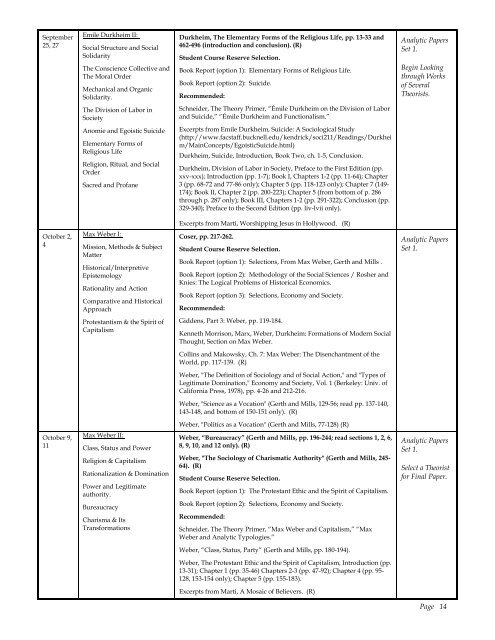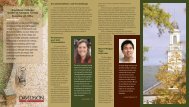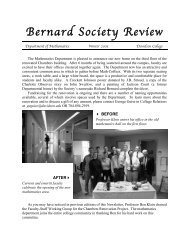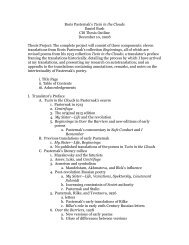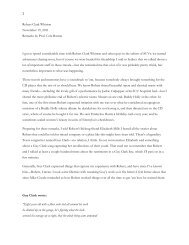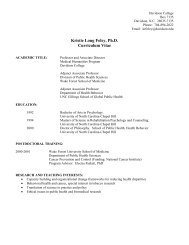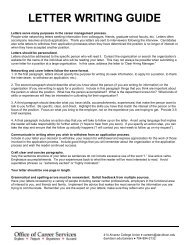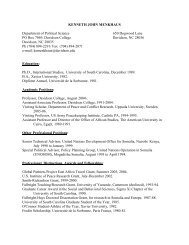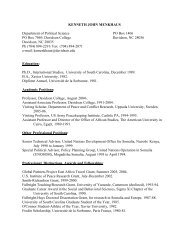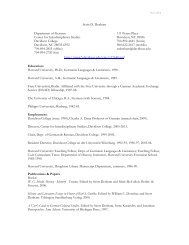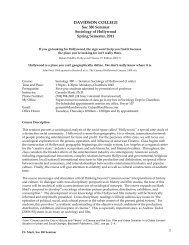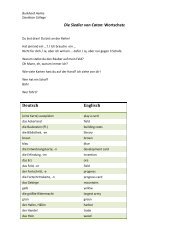Syllabus - Sociological Theory - Davidson College
Syllabus - Sociological Theory - Davidson College
Syllabus - Sociological Theory - Davidson College
Create successful ePaper yourself
Turn your PDF publications into a flip-book with our unique Google optimized e-Paper software.
September<br />
25, 27<br />
October 2,<br />
4<br />
October 9,<br />
11<br />
Emile Durkheim II:<br />
Social Structure and Social<br />
Solidarity<br />
The Conscience Collective and<br />
The Moral Order<br />
Mechanical and Organic<br />
Solidarity.<br />
The Division of Labor in<br />
Society<br />
Anomie and Egoistic Suicide<br />
Elementary Forms of<br />
Religious Life<br />
Religion, Ritual, and Social<br />
Order<br />
Sacred and Profane<br />
Max Weber I:<br />
Mission, Methods & Subject<br />
Matter<br />
Historical/Interpretive<br />
Epistemology<br />
Rationality and Action<br />
Comparative and Historical<br />
Approach<br />
Protestantism & the Spirit of<br />
Capitalism<br />
Max Weber II:<br />
Class, Status and Power<br />
Religion & Capitalism<br />
Rationalization & Domination<br />
Power and Legitimate<br />
authority.<br />
Bureaucracy<br />
Charisma & Its<br />
Transformations<br />
Durkheim, The Elementary Forms of the Religious Life, pp. 13-33 and<br />
462-496 (introduction and conclusion). (R)<br />
Student Course Reserve Selection.<br />
Book Report (option 1): Elementary Forms of Religious Life.<br />
Book Report (option 2): Suicide.<br />
Recommended:<br />
Schneider, The <strong>Theory</strong> Primer, “Émile Durkheim on the Division of Labor<br />
and Suicide,” “Émile Durkheim and Functionalism.”<br />
Excerpts from Emile Durkheim, Suicide: A <strong>Sociological</strong> Study<br />
(http://www.facstaff.bucknell.edu/kendrick/soci211/Readings/Durkhei<br />
m/MainConcepts/EgoisticSuicide.html)<br />
Durkheim, Suicide, Introduction, Book Two, ch. 1-5, Conclusion.<br />
Durkheim, Division of Labor in Society, Preface to the First Edition (pp.<br />
xxv-xxx); Introduction (pp. 1-7); Book I, Chapters 1-2 (pp. 11-64); Chapter<br />
3 (pp. 68-72 and 77-86 only); Chapter 5 (pp. 118-123 only); Chapter 7 (149-<br />
174); Book II, Chapter 2 (pp. 200-223); Chapter 5 (from bottom of p. 286<br />
through p. 287 only); Book III, Chapters 1-2 (pp. 291-322); Conclusion (pp.<br />
329-340); Preface to the Second Edition (pp. liv-lvii only).<br />
Excerpts from Marti, Worshipping Jesus in Hollywood. (R)<br />
Coser, pp. 217-262.<br />
Student Course Reserve Selection.<br />
Book Report (option 1): Selections, From Max Weber, Gerth and Mills .<br />
Book Report (option 2): Methodology of the Social Sciences / Rosher and<br />
Knies: The Logical Problems of Historical Economics.<br />
Book Report (option 3): Selections, Economy and Society.<br />
Recommended:<br />
Giddens, Part 3: Weber, pp. 119-184.<br />
Kenneth Morrison, Marx, Weber, Durkheim: Formations of Modern Social<br />
Thought, Section on Max Weber.<br />
Collins and Makowsky, Ch. 7: Max Weber: The Disenchantment of the<br />
World, pp. 117-139. (R)<br />
Weber, "The Definition of Sociology and of Social Action," and "Types of<br />
Legitimate Domination," Economy and Society, Vol. 1 (Berkeley: Univ. of<br />
California Press, 1978), pp. 4-26 and 212-216.<br />
Weber, "Science as a Vocation" (Gerth and Mills, 129-56; read pp. 137-140,<br />
143-148, and bottom of 150-151 only). (R)<br />
Weber, "Politics as a Vocation" (Gerth and Mills, 77-128) (R)<br />
Weber, “Bureaucracy” (Gerth and Mills, pp. 196-244; read sections 1, 2, 6,<br />
8, 9, 10, and 12 only). (R)<br />
Weber, "The Sociology of Charismatic Authority" (Gerth and Mills, 245-<br />
64). (R)<br />
Student Course Reserve Selection.<br />
Book Report (option 1): The Protestant Ethic and the Spirit of Capitalism.<br />
Book Report (option 2): Selections, Economy and Society.<br />
Recommended:<br />
Schneider, The <strong>Theory</strong> Primer, “Max Weber and Capitalism,” “Max<br />
Weber and Analytic Typologies.”<br />
Weber, “Class, Status, Party” (Gerth and Mills, pp. 180-194).<br />
Weber, The Protestant Ethic and the Spirit of Capitalism, Introduction (pp.<br />
13-31); Chapter 1 (pp. 35-46) Chapters 2-3 (pp. 47-92); Chapter 4 (pp. 95-<br />
128, 153-154 only); Chapter 5 (pp. 155-183).<br />
Excerpts from Marti, A Mosaic of Believers. (R)<br />
Analytic Papers<br />
Set 1.<br />
Begin Looking<br />
through Works<br />
of Several<br />
Theorists.<br />
Analytic Papers<br />
Set 1.<br />
Analytic Papers<br />
Set 1.<br />
Select a Theorist<br />
for Final Paper.<br />
Page 14


